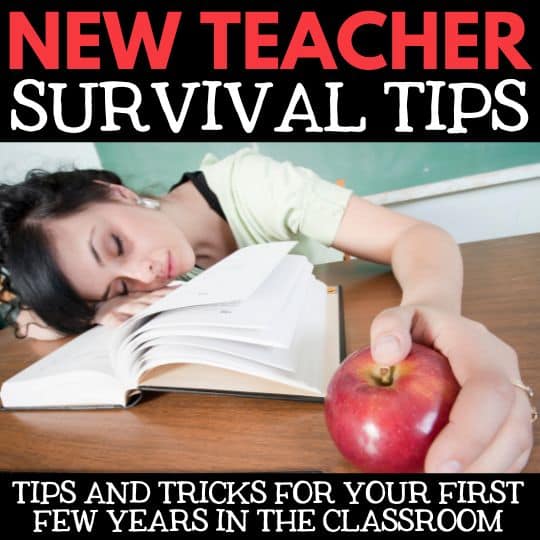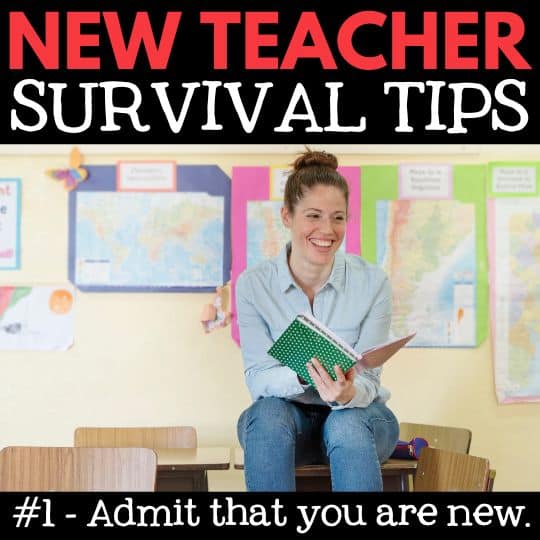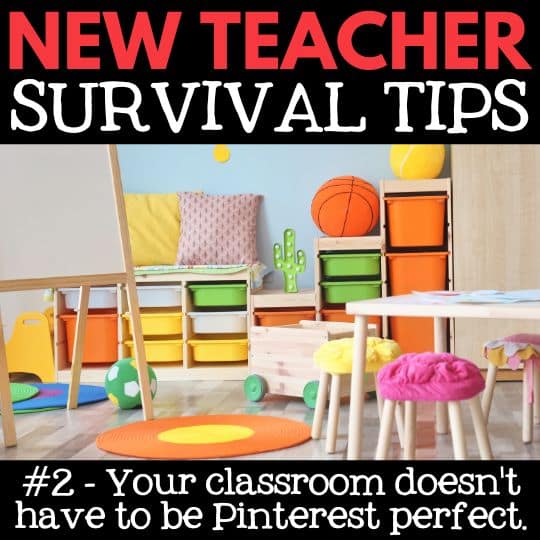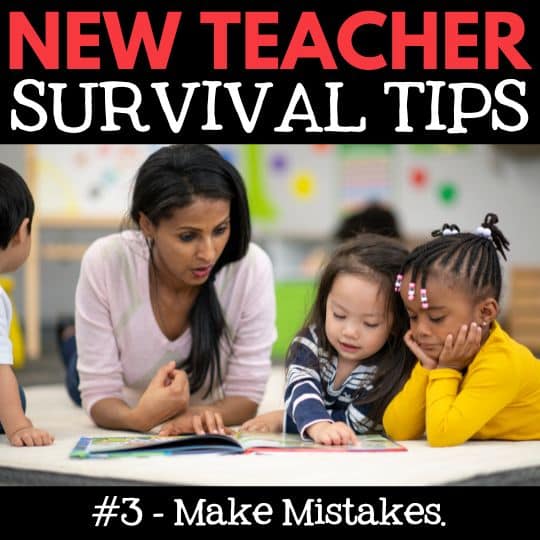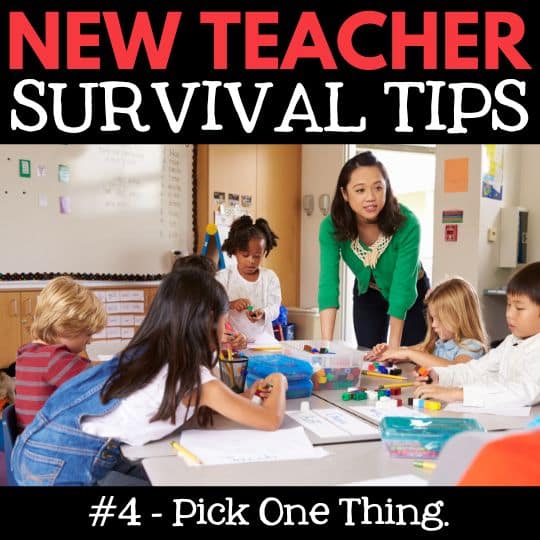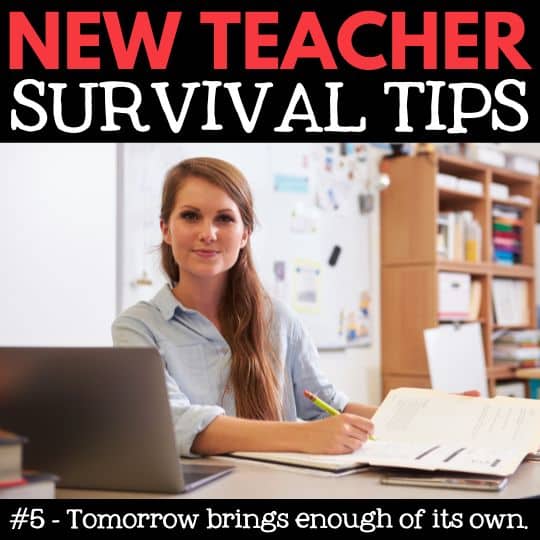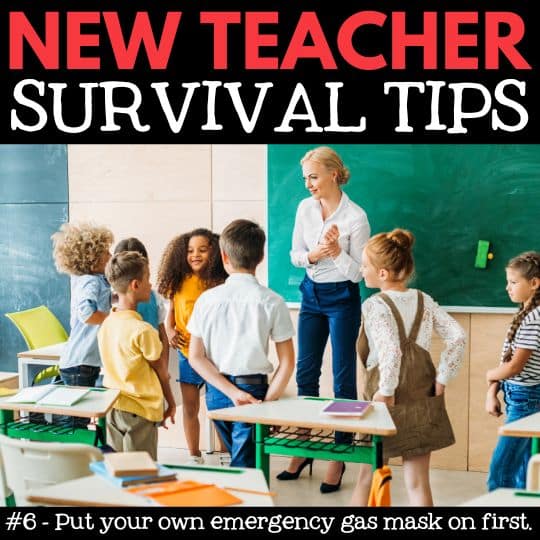New Teacher Survival tips
By MARISSA DESPINS Updated April 10, 2024
Every time I go on social media, I am bombarded by talk of the teacher retention issues going on in our world right now (don’t get me started). Because of this, I feel like this coming year is going to bring a substantial number of new teachers to the profession. If you are one of those new teachers, I am so appreciative of you, and I am so glad you are here reading this blog. Teaching is a truly noble and valuable profession. However, it can also be overwhelming, stressful, and exhausting. Today I share 6 new teacher survival tips that I wish someone had told me before I started. Hopefully they can help you make your first few years in the classroom a little bit easier.
Top New Teacher Survival Tips
I kind of feel like I have had two different “new teacher” moments in my career. I spent the majority of my teaching life teaching middle school English and History, which I absolutely loved. Thankfully, I had two fantastic mentor teachers that helped make the transition from college student to new teacher relatively painless. They were there for me to ask questions, to vent to, and to celebrate with.
Later in my career, however, I decided to make the switch from middle school to elementary. I took the leap and began teaching 4th grade at a new school. Even though I was a “well seasoned” teacher at this time, I still found the transition incredibly difficult. Without the same support network in place, it was really hard to be a new teacher again! This fresh perspective gave me a lot to reflect on, and I share some of these reflections and new teacher survival tips below.
1- Admit that you are new
The number one thing to add to your list of new teacher survival tips is to admit you are new. We have all been there. Young, fresh, and ready to take on the world. You still have that new car smell.
The bonus of being new? Other teachers are willing to help you (and if they are not, it is best to know who those people are now). Be open, accepting, and appreciative of the help they give. Many have been in the classroom trenches for a long time, and can be an absolute wealth of knowledge and support.
Received your first nasty parent email? Sheila down the hall went through the same thing with that parent last year.
Don’t know how to use the copier? Jim next door can teach you his hack to keep it from jamming, and also has a lead on a secret paper supply he can share with you.
Don’t know what novel study to teach? Sara has a class set of novels and binder of resources she is more than happy to share with you.
Admit you are new and don’t have all of the answers. I can guarantee that your past educational experience absolutely did not prepare you for all of the things you are expected to do and know. Ask for help. Your co-workers are your very best resource.
2- Your classroom doesn’t need to be Pinterest perfect
I know, I know, this can be the hardest piece of advice to hear. We all of have dreams of having our beautiful color coordinated classrooms with gorgeous bulletin boards, creative quotes, and curated picture book displays. I have been there.
I am not going to tell you not to spend time making your classroom into a space you love. The truth is, you are going to spend a heck of a lot of time in that space, so you may as well make it into a space you like being in. However, that doesn’t mean spending the whole month of July (yep, I’ve done that) and ridiculous amounts of money at the target dollar spot so you can have everything 100% ready for the first day back. You have years and years to slowly build up your classroom. It absolutely does not need to be done right away.
Also, in the overall scheme of things, your classroom doesn’t have to be “perfect”. It doesn’t matter if all of your book bins match. What does matter is that you create a space where students feel safe and loved, that your create a classroom culture of respect and kindness, and that you teach students lessons that are rigorous and fun.
Instead of making the tenth trip to target to spend more of your own limited resources on things that Instagram has told you are “necessities”, sit down and plan out some lessons. Research ways to engage your kiddos. Decide what you are going to do to ensure your environment feels inclusive.
These are the things that really matter. The Pinterest-worthy classroom will come in time.
For our favorite classroom organization tips, be sure to check out these organizational hacks!
3- Make Mistakes
Develop a growth mindset and remember that mistakes are the steps we need to go through in order to reach mastery. Try new things and get a little messy. Make some mistakes, learn from your blunders, and move forward. Every little mistake you make is a valuable learning experience. They help you to grow and become the best teacher you can be.
For more information on Growth Mindset (and a FREE resource for your class!), check out this blog post.
4- Pick one thing
In your first few years of teaching (or always???) you will be bombarded with new programs, teaching strategies, and pedagogies. From PBL, Writer’s Workshop, Guided Reading, Math Stations, Story Studio, and a million more “best practices”, it is easy to get overwhelmed really quickly.
Instead of trying to do-all-the-things, pick one. Read books on it. Attend conferences. Research related blog posts. Practice, Practice, Practice. Do some deep reflection on whether or not it meet the needs of the learners in your classroom and your particular teaching style. Then, when you have that down, move on to the next thing on your list.
When it comes to new teacher survival tips, remember to keep in mind: It is better to do one or two things really well than a bunch of things badly.
5- Tomorrow brings enough of its own
It can be easy to feel overwhelmed when there is just-so-much-to-do. I have most definitely been there. However, do your best to have things prepped and planned for the next day before you head home each day. When you are tired after a long day, it is easy to think that you can just come in a bit earlier the next day to make copies. However, this is inevitably when the copier crashes, when a parent shows up unexpectedly, or an impromptu meeting is called. Save yourself the stress by making sure you have everything you need ready to go the day before.
Unexpected absences are something else to think about with this. I can clearly remember waking up with a head-to-toe, itchy, swollen rash one morning during my first year of teaching, and having to get my husband to rush me to the emergency room. Turns out my body was revolting against a new laundry detergent we had just washed our sheets in. I had to get a needle of super drowsy emergency allergy medication in my bum, and spent the day out cold on the couch. Thankfully, I had my lessons for the day already prepped and ready on my desk, so an emergency sub was able to simply pop in and teach them.
Long story short – you never know when the unexpected can happen. When it comes to new teacher survival tips, always remember to have your stuff prepped and ready to go in advance, just in case.
6- Put your emergency Gas mask on first
When the plane stewardess talks about the need to put your own gas mask on before you can help the person sitting next to you, she may as well have been talking about teaching. Unless you take care of yourself, you can’t do all of the wonderful and miraculous things you do to help the learners in your classroom.
Feeling tired and burned out? Take a sick day. One preventative day to rest, recharge, and reflect can honestly prevent you from having to take a week off later in the year. All of the chaos will be there when you return, but you will be able to tackle it with the fresh eyes and attitude that a reflective break can bring.
Looking for some free resources to help get you started?
Check out the FREE resources below – they contains tons of great information to help you set up new routines in your classroom!
Starting your career as a substitute teacher? Check out our top tips for substitutes and sub plan ideas!
Looking for more New Teacher Survival Tips?
Check out these blog posts for more information!
Reading Comprehension Strategies: What are they?
3 Ways to Cultivate a Love of Reading
Benefits of Teaching Novel Studies
Interested in signing up for my email list?
If you are interested in signing up for my email list, you can do so by clicking on the link below. I periodically send out emails with free resources, new teacher survival tips, and exclusive deals. Signing up will also give you immediate access to some of my best selling Interactive Notebook resources – foldable activities, graphic organizers, and other fun activities.
